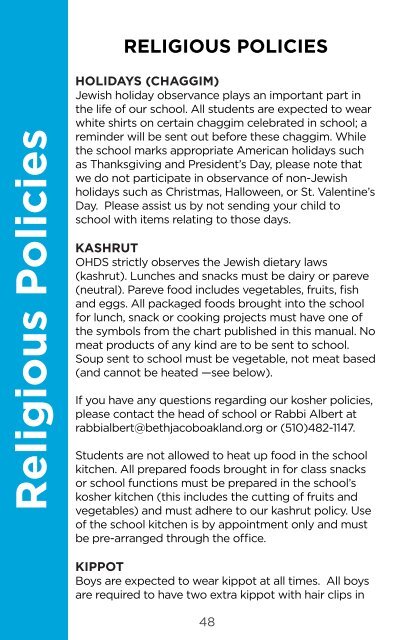Family Handbook 2018-2019
You also want an ePaper? Increase the reach of your titles
YUMPU automatically turns print PDFs into web optimized ePapers that Google loves.
RELIGIOUS POLICIES<br />
their • backpacks. Please label them with your child’s<br />
name.<br />
Religious Policies<br />
HOLIDAYS (CHAGGIM)<br />
Jewish holiday observance plays an important part in<br />
the life of our school. All students are expected to wear<br />
white shirts on certain chaggim celebrated in school; a<br />
reminder will be sent out before these chaggim. While<br />
the school marks appropriate American holidays such<br />
as Thanksgiving and President’s Day, please note that<br />
we do not participate in observance of non-Jewish<br />
holidays such as Christmas, Halloween, or St. Valentine’s<br />
Day. Please assist us by not sending your child to<br />
school with items relating to those days.<br />
KASHRUT<br />
OHDS strictly observes the Jewish dietary laws<br />
(kashrut). Lunches and snacks must be dairy or pareve<br />
(neutral). Pareve food includes vegetables, fruits, fish<br />
and eggs. All packaged foods brought into the school<br />
for lunch, snack or cooking projects must have one of<br />
the symbols from the chart published in this manual. No<br />
meat products of any kind are to be sent to school.<br />
Soup sent to school must be vegetable, not meat based<br />
(and cannot be heated —see below).<br />
If you have any questions regarding our kosher policies,<br />
please contact the head of school or Rabbi Albert at<br />
rabbialbert@bethjacoboakland.org or (510)482-1147.<br />
Students are not allowed to heat up food in the school<br />
kitchen. All prepared foods brought in for class snacks<br />
or school functions must be prepared in the school’s<br />
kosher kitchen (this includes the cutting of fruits and<br />
vegetables) and must adhere to our kashrut policy. Use<br />
of the school kitchen is by appointment only and must<br />
be pre-arranged through the office.<br />
All Jewish males are expected to wear kippot when<br />
attending any school function or working in the<br />
classrooms.<br />
PRAYER (TEFILLAH)<br />
Every class begins the day with tefillah (prayer).<br />
In grades BK–5, boys and girls pray together as a<br />
class. Tefillah helps the children bond together as a<br />
community, and begin the day on an upbeat, spiritual<br />
note. We emphasize not only the skills involved in<br />
praying and familiarity with traditional prayers, but<br />
also the feeling and meaning behind the prayers, and<br />
the individual nature of the praying experience.<br />
The boys and girls in grades 6–8 either pray<br />
separately, allowing all students to have an equal<br />
opportunity for prayer leadership, or together, using<br />
a mechitzah as a reflection of the special nature of<br />
our school, a Modern Orthodox institution that serves<br />
the entire community. Tefillah in the middle school<br />
starts at 8:15 a.m., so please be sure to bring your<br />
child to school on time.<br />
TZEDAKAH<br />
Many classes collect tzedakah as a means of<br />
inculcating the Jewish values of giving and sharing<br />
with others. Your child’s teacher will let you know the<br />
pattern of tzedakah collection in your child’s class. In<br />
addition, children will participate in various forms of<br />
community service projects throughout the year.<br />
Religious Policies<br />
KIPPOT<br />
Boys are expected to wear kippot at all times. All boys<br />
are required to have two extra kippot with hair clips in<br />
48<br />
49



